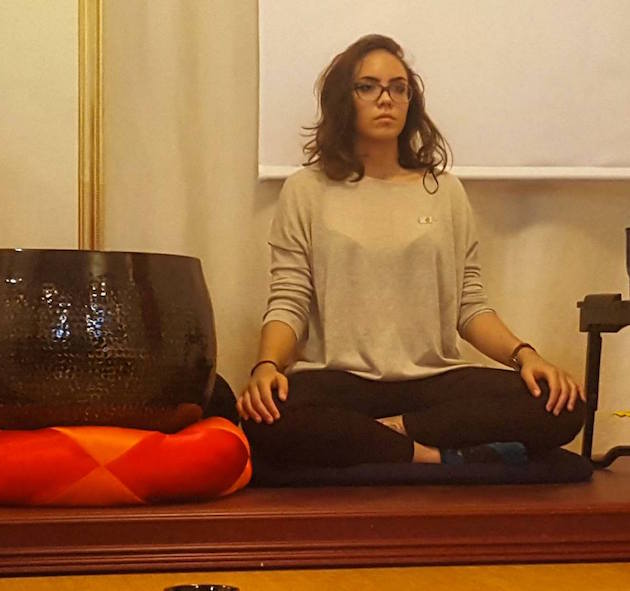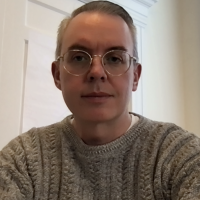
Some people, even those who appreciate Buddhist teachings somewhat, and who aren’t particularly religious, ask me why it’s necessary to adopt the label of Buddhist. Why do I have to join the club and wear the hat, so to speak.
Lately, I’ve been thinking that becoming a Buddhist is similar to picking a college major. You could spend all your time taking classes in many different disciplines, a lit class here, an economics class there, but if you ever want to become proficient in a subject and learn it well enough to be able to make a living from it, or make a meaningful contribution you’ll need to focus primarily on one field.
When I went back to school after about a 10 year hiatus, I started gathering my liberal arts requirements. I was intending to major in English, but, then I took an Intro to Psychology course my first semester back with a wonderful and engaging teacher and decided to switch to psychology.
On my way to a BA in psychology, I began taking many survey courses in the field: social psychology, cognitive psychology, abnormal psychology, research methods, and so on. Later the classes became a little more specific: personality, motivation, “the self,” etc.
In graduate school things become even more specialized. You enter an area of focus, such as, social or clinical psychology, learn how to conduct research experiments, study trends and accumulated knowledge and eventually become certified as an expert in the field and able to do your own original work.
My “spiritual” practice is very much the same. I put spiritual in quotes because most of what I do and think doesn’t strike me as particularly mystical or otherworldly.
In The Wisdom of No Escape, Pema Chödrön talks about this tendency of “spiritual shoppers,” who dip their toe in the water of many different streams. What usually happens is that as soon as the water gets a little too hot, i.e., uncomfortable, the person heads off to the next thing forever trying to find that magical pill of bliss and sparkles that will allow them to enjoy all the goodies without having to endure any of the pain.
Instead, Pema, by way of her teacher, Chögyam Trungpa, suggests “sticking to one boat.” She said that Trungpa Rinpoche’s main teaching for the first five years he was in the U.S., was basically some form of: “Stop shopping and settle down and go deeply into one body of truth.”
In doing so, we would definitely meet all of our “dragons” and put ourselves through the changes necessary to grow and actualize the benefits of the practice and wisdom in our own experiences and being.
So, becoming a Buddhist—or a yogi, of a Sufi, or a Christian mystic—is about making a commitment that you are going to do this one thing; you’ve connected in some way with the teachings and worldview of the tradition, and through practice you’ve glimpsed a taste of the fruition and have decided that it is a good fit for you.
I have seen this process first hand. For five years I read many books and theorized about Eastern religion and philosophy, thought it was all quite impressive and alluring, labeled myself at different times a Zen Buddhist, a Taoist, or some sort of lone wandering truth seeker, but it didn’t really work at all. I was still miserable, nihilistic, and self destructive. It was still totally conceptual and a form of mental gymnastics.
It wasn’t until I found my one boat and set sail over the rocky, shark-infested seas that anything actually “happened.” Becoming a Shambhala Buddhist was like picking a major and beginning a doctorate program in relaxing into the experience of my own perpetually awakened nature. For simplicity sake, we could call it a PhD in Basic Goodness. (I’m still working on it, by the way.)
Chogyam Trungpa, his heir and current lineage holder, Sakyong Mipham, and his students created a course of practice and study that, in a lot of ways, mirrors a college curriculum (Trungpa Rinpoche did also found Naropa University in Boulder, the first Buddhist inspired university in the West.)
It begins with a heavy focus on sitting meditation (shamatha), where one begins to tame their mind, in order that it may be trained (in uncovering the awake qualities that are already existing slightly below our normal discursive conceptual mind).
There are weekend retreats and weeknight classes that begin by looking at our confusion and discontent, how the ego is formed and sustained, tools for working with emotions and habitual patterns, learning to cultivate compassion and equanimity, and on and on. One can progress into week or month long retreats, and further and further advanced trainings and programs.
There is a progression in the practices and teachings in the same way that there is a progression from algebra to geometry to trigonometry and calculus. In the same way that you wouldn’t take calculus before algebra, in Buddhism you wouldn’t practice a vajrayana sadhana, usually, before you studied The Four Noble Truths.
So, in Buddhism, you participate in a ceremony called The Refuge Vow where you make a commitment—mainly to yourself, mainly to your own sanity—and you say this is the boat I am going to travel this vast ocean of consciousness. And you work with other more experienced members of the crew—sangha—and you learn the ropes, you learn how to catch a little wind in those sails, and after a while you look back at the port and realize that you have actually changed. You’re not the same person you once were.
So, that’s why I am a Buddhist. We take on the label—but we don’t need to make a big deal about it. We take refuge in the three jewels, seeing the Buddha as a model or example of a fully actualized human being, we commit to practicing the Buddha’s teachings (dharma), and to travel the path with the community of practitioners (sangha) who are also working on waking up from the delusion that prevents us from realizing who we really are.
I also recognize, of course, that there are many other worthy vessels (you also learn to beat metaphors to death, apparently) in which to cross the sea, and that others may be just fine, kind, and loving people and lead perfectly happy lives without ever choosing to take a journey like this. That’s wonderful too. Maybe some of us just need a little more help to get there.
~
Relephant read:
The Simple Technique that Changed My Life.
~
Author: Travis May
Image: Photo of Azia May–Courtesy of Author


 Share on bsky
Share on bsky




Read 3 comments and reply